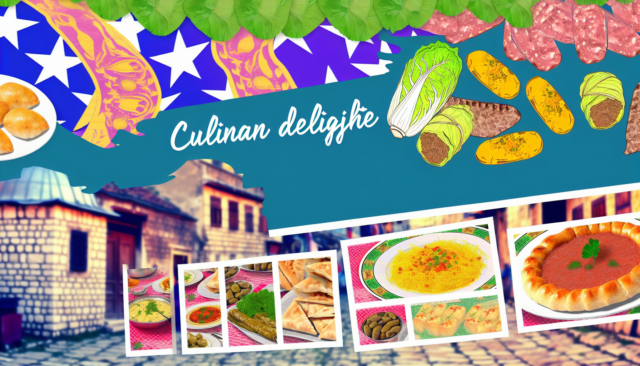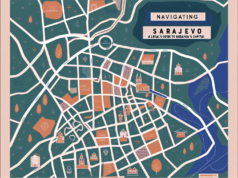
Nestled in the heart of the Balkan Peninsula, Bosnia and Herzegovina presents a rich tapestry of flavors, traditions, and culinary techniques that reflect its diverse history and cultural influences. Foodies eager to explore new gastronomic horizons will find that Bosnian cuisine is a delightful blend of Mediterranean, Ottoman, and Central European influences. This guide will explore the distinct dishes, ingredients, and dining customs that make Bosnian cuisine an unforgettable experience.
A Culinary Mosaic
Bosnia’s culinary landscape is hugely influenced by its history, shaped by the Ottoman Empire, Austro-Hungarian rule, and the Mediterranean climate. Bosnian cuisine is marked by hearty ingredients, aromatic spices, and rustic cooking methods. It features an array of meats, fresh vegetables, and delectable baked goods, resulting in a harmoniously balanced diet that celebrates the land’s natural bounty.
Traditional Dishes to Savor
1. Ćevapi
Undoubtedly one of the most beloved dishes in Bosnia, ćevapi (or ćevapčići) are small, grilled minced meats, typically made from a blend of beef and lamb. These flavorful morsels are usually served in a flatbread called somun, accompanied by chopped onions and red pepper-based condiment known as ajvar. The combination of char-grilled crust and tender inside creates a culinary experience that is not to be missed, especially when enjoyed at a local grill house known as "tašana".
2. Sogan-dolma
For a taste of Bosnian comfort food, look no further than sogan-dolma – stuffed onions filled with a savory mix of meat, rice, and various spices. Slow-cooked in a flavorful broth, the dish is fragrant and satisfying, showcasing the skill of Bosnian cooks who transform simple ingredients into mouthwatering meals.
3. Burek
A pastry with roots that stretch across the Balkans, burek is a flaky pastry filled typically with minced meat, but variations include cheese and spinach, making it a favorite among vegetarians. Served hot, with a side of yogurt, it is a perfect snack for any time of day, whether enjoyed in a cozy restaurant or from a street vendor’s kiosk.
4. Pita
Bosnia’s love for pastries extends beyond burek to a range of pies, commonly referred to as pita. Whether it’s stuffed with potatoes, pumpkins, or apples, these golden, flaky pastries are universally loved. Sweet versions often come with a sprinkle of powdered sugar, while savory ones can feature a medley of greens and cheeses.
5. Grilled Fish
Bosnia’s rivers and lakes provide plenty of fresh fish, and grilled trout is particularly popular. Seasoned with simple herbs and spices, this dish embodies the philosophy of Bosnian cooking: celebrate the natural flavors of quality ingredients. Often served with a side of fresh vegetables and potatoes, grilled fish brings a delightful taste of the outdoors to the dining table.
Something Sweet
No meal in Bosnia is complete without dessert. Traditional sweets such as tufahija, a stuffed baked apple with walnuts and sugar, and baklava, layers of filo pastry generously filled with nuts and honey syrup, are a must-try. These sweet treats offer a perfect finale to a hearty Bosnian meal.
Beverages: Sip and Savor
When dining in Bosnia, the beverage selection is just as important as the food. Bosnians take pride in their coffee culture, opting for strong, Turkish-style coffee often prepared in a special pot called "džezva". It is served unfiltered, with a thick layer of grounds settling at the bottom of the cup, making the experience feel indulgent and social.
Additionally, herbal teas, fruit juices, and locally produced wines are popular choices, reflecting the region’s favorable agricultural conditions and the revival of traditional viticulture.
Dining Culture
When dining in Bosnia, the experience is rooted in hospitality and community. Meals are often shared with family and friends, bringing people together to celebrate life’s moments, both big and small. It is not uncommon for a meal to be accompanied by lively conversation and laughter, creating a warm and inviting atmosphere.
Visitors should also note that it’s customary to accept offers of food and drink as a sign of respect and appreciation to the host. Savoring the food is equally important; dining is seen not only as a necessity but also as a cherished social event.
Conclusion
Bosnian cuisine is a celebration of flavor, hospitality, and rich cultural heritage. A visit to Bosnia and Herzegovina is not merely a trip; it’s an invitation to savor and indulge in gastronomic artistry that transcends borders. Whether you’re enjoying the smoky grill of ćevapi, the flaky layers of burek, or the simple sweetness of tufahija, every bite offers a story of tradition, diversity, and the enduring warmth of shared meals. For any foodie with a penchant for exploration, Bosnian cuisine is a must-visit treasure trove waiting to be discovered.













